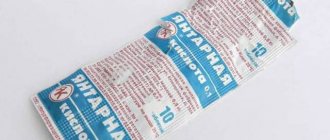Ibuprofen is a non-steroidal anti-inflammatory drug. It has three properties characteristic of drugs in this group: antipyretic, analgesic and anti-inflammatory. Available in various forms - tablets, capsules, suspensions for use in children and ointments for external use.
In general, the drug is quite safe and does not cause side effects at the recommended dosage. But it is important not to self-medicate: this can not only worsen the course of the underlying disease, but also cause an overdose of Ibuprofen, which can cause serious harm to the human body.
When is the medicine used?
The use of Ibuprofen is advisable for pain of various origins: joint, headache, dental, menstrual. It is also prescribed at high temperatures as an antipyretic. Many patients, due to their busyness, reluctance to stand in line at the clinic, or simply laziness, do not seek advice from a doctor. As a result, some people use this drug constantly and forget about precautions. The fact is that an overdose of Ibuprofen can occur not only due to its use in increased quantities, but also due to its constant use.
Indications for use
Ibuprofic medicine is indicated for pain of various etiologies and for fever
, which is caused by various reasons. Indications for use are:
- fever caused by infectious diseases and influenza. As well as elevated temperature during teething in children or after routine preventive vaccinations;
- acute pain with tonsillitis, otitis;
- migraine;
- toothache;
- arthritis;
- pain in various diseases of the spinal column and joints.
Causes of Ibuprofen poisoning
The characteristics of the toxic effects of Ibuprofen have not been sufficiently studied. It is assumed that its negative impact is associated with a slowdown in the synthesis of prostaglandins, that is, biologically active substances that take part in some physiological reactions in the body. Side effects are attributed to a decrease in prostaglandin production.
These include:
- decreased blood flow to the kidneys;
- defects of the gastrointestinal mucosa;
- platelet aggregation disorders.
These effects are further intensified, signs of poisoning appear, and as a result, convulsions, respiratory arrest, that is, apnea, and death are possible. An overdose of Ibuprofen is very dangerous.
Serious side effects
Research shows that most people who use ibuprofen experience minor health problems. Serious side effects that may occur in a small percentage of people include:
- Severe chest pain
- Kidney problems
- Liver damage
- Fatigue (extreme tiredness)
- Speech problems
In some cases, allergic reactions have also been reported. People who are allergic to this drug are advised to avoid its use. Allergic reactions may include:
- Red skin rashes
- Urticaria
- Facial swelling
- Difficulty breathing
- The appearance of blisters on the skin
We invite you to familiarize yourself with Types of stomatitis in adults and children
Internal bleeding resulting from taking ibuprofen can be dangerous. The following side effects of this drug indicate bleeding in the stomach or intestines:
- Presence of blood in the stool, tarry stool
- Presence of blood in vomit
- Presence of blood in urine
What happens with long-term use?
One such case was described by Australian doctors when patients were admitted to hospitals complaining of the development of paralysis and muscle weakness. All of them took this drug for a long time, wanting to eliminate chronic pain.
Blood tests were taken from the patients and hypokalemia was found, that is, a decrease in potassium concentration. A deficiency of this element causes defects in muscle polarization, resulting in paresis, paralysis, heart rhythm disturbances, and digestive and respiratory defects.
Stories from our readers
Vladimir 61 years old
I clean my vessels regularly every year. I started doing this when I turned 30, because the pressure was too low. The doctors just shrugged their shoulders. I had to take charge of my health myself. I tried different methods, but one helps me especially well... Read more >>>
- Chronic heart failure.
- Diseases of the optic nerve.
- Diseases of the gastrointestinal tract in the acute stage.
- Severe diathesis.
- Stable high blood pressure.
- Wounds on the skin (for ointment and gel).
- Lactation.
- Last trimester of pregnancy.
- Children under three months, for suspension.
- Children under six years of age, for tablets.
- History of allergic reactions.
If the patient has a medical history of any of these diseases or conditions, the dose of the drug is adjusted by the doctor or the medicine is replaced.
Why does an overdose of Ibuprofen occur?
Ibuprofen comes in various forms. One tablet contains two hundred milligrams of the active substance. According to the instructions, for adults the maximum permissible daily dose is 2400 mg, that is, twelve tablets. This amount is divided into three or four doses with a break between them of four to six hours.
After pharmacies began selling Ibuprofen without a prescription, cases of adverse symptoms became more frequent. To escape pain, people have been drinking it for years, and the consequences are ultimately very serious.
An overdose of Ibuprofen is possible in the following cases:
- Wrong reception. Since the drug is produced by many pharmaceutical companies and in different forms, there is confusion. Patients often forget to read the instructions and see how much of the active ingredient is contained. Acting in accordance with his habits, a person is able to take more medicine than is allowed.
- Storing the medication in a place open to child access. It is also possible that a child finds a tasty syrup and drinks the entire bottle. In this case, we are talking about an overdose of this drug in children.
- During self-medication. Patients sometimes do not trust doctors and strive to fight the disease on their own, based on the advice of others. Usually such experiments have a disastrous outcome. A prolonged and constant increase in temperature, which accompanies serious infectious diseases, purulent inflammation and sepsis, is reduced by an excessive amount of Ibuprofen.
It is worth paying attention to the fact that patients are required to know in what quantity the use of tablets can cause an overdose. If you take the drug in excess of the specified norm, serious consequences may occur. Severe disorders in adults most often occur when taking doses exceeding four hundred milligrams per kilogram.
We will consider an overdose of Ibuprofen in children below.
Description and properties of the drug
Ibuprofen (Latin name - Ibuprophenum) according to its pharmacological properties belongs to the group of NSAIDs (non-steroidal anti-inflammatory drugs). The active ingredient of the drug, ibuprofen, is a derivative of propionic acid, a colorless, caustic liquid with a pungent odor that exhibits the properties of fatty acids. The main danger of salts and anions of propionic acid is corroding the mucous membrane of the gastrointestinal tract, therefore, persons with gastric and duodenal ulcers, gastritis, colitis and other pathologies of the digestive system are recommended to choose other antipyretic and analgesic medications (for example, Paracetamol).
Ibuprofen has a fairly high absorption (rate of absorption into the systemic circulation): the active substance of the drug reaches its maximum concentration in the blood plasma within 1 hour after administration. This must be taken into account when providing emergency care, since after this period, irreversible changes may begin in the body. If the patient took Ibuprofen after meals, maximum accumulation in tissues occurs after 1.5-2.5 hours.
Pharmacological properties of Ibuprofen:
- reduces the synthesis of prostaglandins (mediators of inflammatory processes);
- blocks the activity of cyclooxygenases - enzymes involved in the synthesis of prostaglandins;
- reduces the permeability of vascular walls and normalizes the circulation of fluids in the microvasculature;
- reduces the production of bradykinin, a peptide that causes vasodilation and increased blood pressure;
- releases inflammatory mediators from cells;
- reduces swelling;
- restores joint mobility;
- reduces the frequency of uterine contractions and helps lower intrauterine pressure.
The drug has a pronounced anti-inflammatory, analgesic and antipyretic effect. Ibuprofen can be used to reduce fever in infectious diseases, relieve various types of pain and complex treatment of diseases accompanied by inflammation of fluids and tissues, for example, pathologies of the musculoskeletal system.
Note! Ibuprofen can be produced under the following trade names (also included in these drugs in combination with other substances): Nurofen, Dolgit, Next, Ibuklin, Solpaflex, Brufen, Bonifen.
Signs of poisoning
In medical practice, there are often cases when a patient takes a drug uncontrollably. But the consequences of an overdose of this drug are determined not only by the number of tablets, but also by the time that has passed after taking it.
If the dose of Ibuprofen has been exceeded, the following signs of poisoning are observed:
- Defects of the digestive system, namely stool disorders, abdominal pain, vomiting, nausea.
- Visual disturbances due to the effect of high doses of the drug on the optic nerve: unclear and blurry images, a feeling of double vision of objects. Everyone should know the symptoms of an Ibuprofen overdose.
- Toxic hepatitis - pain in the side, enlarged liver, jaundice, transformations in liver tests: increased ALT, AST, and in some cases alkaline phosphatase.
- Changes in the nervous system: drowsiness, convulsions, lethargy, depression of consciousness.
- Hemorrhagic syndrome, manifested in the form of intestinal or gastric bleeding, can also bleed ulcers in the oral cavity.
- Heart pathologies: increased blood pressure, bradycardia.
- Various allergic reactions, such as swelling, breathing defects, attacks of bronchial asthma, urticaria.
- Metabolic disorders: acidosis.
- Kidney function defects.
- The occurrence of nystagmus.
- Depression.
- Hearing impairment. The consequences of an overdose of Ibuprofen can be very serious.
Possible complications
Severe intoxication of the liver can lead to disruption of its condition and functioning, which in the future may result in pathologies of the organ and disruption of the biliary tract.
If there is an overdose of Ibuprofen, there is a possibility of developing an allergic reaction to it, and this will make it impossible to take the medicine in the future.
An overdose can lead to the development of kidney and heart failure. If you take too high a dose of Ibuprofen, bronchospasm may occur and the functioning of the respiratory system may be disrupted, which can lead to respiratory arrest. There is a possibility that a person will develop a coma. Failure of internal organs that are unable to cope with excessive load can cause death.
Considering such extremely severe consequences of an overdose, the drug must be taken carefully, strictly following the doctor’s recommendations. If your health condition worsens while using Ibuprofen, or if side symptoms develop, regardless of its intensity, you should seek medical help.
We suggest you read: How can you get stomatitis?
Nonsteroidal anti-inflammatory drugs are part of a group of drugs that are constantly used in clinical practice. The scope of application of the drugs is the fight against inflammation, lowering the temperature and reducing pain. These symptoms accompany various diseases. The group's drugs constantly undergo the necessary checks and tests to improve the quality and tolerability of drugs.
The popularity of the use of non-steroidal drugs is explained by their analgesic effect and the ability to quickly relieve fever, eliminating the symptoms accompanying inflammatory processes. Ibuprofen is a popular drug of the group. A magic pill that simultaneously relieves pain and inflammation. Due to its high tolerance, it is used in the treatment of a wide group of diseases.
Ibuprofen is an affordable medicine, but the price range among manufacturers is high. There are inexpensive analogues on the market. These include the Belarusian “Ibuprofen Belmed”, which costs from 40 rubles for a pack of 10 tablets. This non-steroidal drug is available without a prescription. Free access to the use of such drugs often leads to the wrong choice of type and dose. For what diseases is ibuprofen prescribed and how to avoid an overdose, we learn from the article.
What to do?
If any signs of drug poisoning appear, you must immediately stop taking it and take measures to save the patient. If first aid is not provided, defects in the most important systems of the body appear - blood circulation, breathing, apnea begins to develop, a coma state ends in death.
It is noted that there is no direct connection between the severity of symptoms and the amount of the drug taken, but the outcome is largely determined by the individual sensitivity of the body. In certain situations, due to the use of tablets in large quantities, there may not be a fatal outcome. The consequences are determined by the patient’s age, the presence of chronic diseases, his weight, etc.
Side effects
Using ibuprofen can cause a number of side effects. It is necessary to closely monitor your health status and symptoms:
- Vomit;
- Dyspnea;
- Decreased vision, swelling of the eyes, conjunctivitis;
- Dizziness, anxiety, insomnia;
- Hypertension;
- Edema;
- Hives.
If the treatment causes a side effect, you should stop taking the medicine and seek medical help.
Features of first aid
There is no special antidote for an overdose of Ibuprofen. The therapeutic course has two directions:
- Elimination of a substance from the body mechanically, that is, by washing the stomach with water.
- Reducing the absorption of the drug into the bloodstream: for this purpose, adsorbents are used, for example, for mild symptoms, activated carbon (from thirty to forty grams). The tablets must be crushed and given to the patient after the stomach is empty. If the degree of poisoning is severe, medications such as Enterosgel and Polysorb are used. What else should you do if you overdose on Ibuprofen?
Diseases of the gastrointestinal tract
When considering such cases, it is worth taking into account that ibuprofen is very irritating to the lining of the stomach and intestines, which can cause damage to them or aggravate existing problems. Moreover, the product helps to weaken blood flow and, as a result, slow down the processes of regeneration and restoration of the gastrointestinal tract. This means that people suffering from stomach and intestinal diseases should avoid taking ibuprofen.
Symptomatic treatment
If taken incorrectly, symptomatic treatment is carried out. Due to the fact that this drug is excreted in the urine and provokes acidosis, patients need an alkaline diuresis. It is necessary to know the timing of drug withdrawal. Its maximum content in the blood is observed after one or two hours, which is determined by the time of taking the medicine - before or after meals. Elimination is carried out through the kidneys, after a day the substance is removed from the body in full.
You need to know how many Ibuprofen tablets (the consequences of an overdose are now known) you can take. For children, one dose can be taken every 6-8 hours, it ranges from 30-40 mg/kg per day. For adults and adolescents, it is also recommended to take the medicine at a dosage of 400 mg every 4-6 hours.
Characteristics of the drug
The medication is a synthetic non-selective non-steroid. Used to block phenylpropionic acid derivatives. The active substance is ibuprofen. Nurofen is considered an almost complete analogue.
Available in a variety of forms. On sale you can find:
Take orally or apply externally depending on your doctor's recommendations. When used internally, it is eliminated within 6–8 hours, which becomes the optimal interval.
Ibuprofen poisoning is only possible when using liquid and tablet forms. More often, intoxication is diagnosed as a result of injury from a solid substance.
The pharmacy offers biconvex coated preparations. The color varies from light to deep pink.
The composition also contains additional components:
- potato starch;
- colloidal silicon dioxide;
- magnesium stearate and hydroxycarbonate;
- food gelatin;
- beeswax;
- flour;
- vanillin;
- dye.
Depending on the manufacturer, the package contains 10–100 tablets.
Ibuprofen is absorbed by the mucous membranes of the gastrointestinal tract. After 1–2 hours, the highest concentration is observed in the blood. It is excreted by the kidneys and in small quantities along with bile. However, only 1% of the substance is present in urine unchanged.
Has the following actions:
In accordance with the WHO decision, Ibuprofen is included in the list of vital drugs for humans.
Indications
The medicine is recommended for the following problems:
- High temperature caused by infections, teething in a child, after vaccinations.
- Migraine.
- Tonsillitis, otitis.
- Arthritis.
- Painful sensations due to pathologies of the joints and spine.
If you experience discomfort in the epigastric region, you should not use Ibuprofen, since the action of the drug is aimed at eliminating characteristic symptoms. This will interfere with the diagnosis of a dangerous condition, such as appendicitis.
Contraindications
You should not take the drug if you have the following problems:
- Pathologies of the optic nerve.
- Chronic heart failure.
- Exacerbation of gastrointestinal diseases.
- Diathesis.
- Hypertension.
- Mechanical damage to the skin, if therapy with ointments is implied.
- Hypersensitivity to ingredients.
Ibuprofen is prohibited during the third trimester of pregnancy and while breastfeeding.
You cannot also use:
- Suspensions for children under 3 months.
- Tablets up to 6 years.
In the presence of chronic pathology, the dosage is adjusted by the doctor.
Sometimes therapy is accompanied by side effects. The following symptoms are likely:
- Nausea and vomiting, heartburn.
- Formation of ulcers on the oral mucosa.
- Obstructive jaundice due to the development of hepatitis.
- Dyspnea.
- Hearing and vision problems.
- Conjunctivitis.
- Migraine, sleep disturbance, confusion.
- Increased heart rate, increased blood pressure.
- Acute renal failure.
- Itching and rash.
- Anemia.
If such symptoms appear, you should consult your doctor about the possibility of changing the drug.
Contraindications
Regardless of the form of release, Ibuprofen should not be used if you are allergic to this medication or other non-steroidal anti-inflammatory drugs.
Suppositories, capsules, tablets and suspensions are prohibited from taking in the following cases:
- acute period or relapse of erosive and ulcerative lesions of the digestive tract;
- pathology of the optic nerve;
- predisposition to bleeding;
- severe pathologies of the liver and kidneys;
- stomach or intestinal bleeding;
- III trimester of pregnancy (in earlier stages the drug can be used with caution).
Ibuprofen can be taken orally once by women who are breastfeeding. If a nursing mother is forced to use the drug for a long time, at a daily dosage of more than 800 mg, the baby must be switched to formula feeding, otherwise poisoning may occur to the child who received Ibuprofen from breast milk.
Gel and ointment should not be applied to open wounds and areas affected by eczema.
Medical certificate
Ibuprofen is a general purpose pain reliever. Most often it is used for migraines and severe headaches. It also helps reduce fever and stop the inflammatory process. The drug is prescribed to both adults and children. It has managed to gain recognition from patients due to its wide range of applications, availability and low cost.
Analogues of the drug
The active substance of the drug is included in many drugs. The table shows the most popular analogues of Ibuprofen. They are rare without side effects. However, their occurrence can be prevented by strictly following the dosage prescribed by your doctor.
| Drug name | Active substance | Company manufacturer | Price |
| Nise | ibuprofen | Dr. Reddis | 210 rub. |
| Nurofen | ibuprofen | Reckitt Benckiser | 110 rub. |
| Diclofenac | diclofenac sodium | Synthesis pharmaceuticals | 50 rub. |
| No-shpa | drotaverine | Sanofi | 50 rub. |
| Ibuklin Junior | ibuprofen + paracetamol | Dr. Reddis | 100 rub. |
Ibuprofen analogues are characterized by the same therapeutic effect. They differ in its duration and form of release. Liquid versions of the drugs are much easier to digest and can be used by children under 12 years of age. Capsules have virtually no harmful effect on the gastric mucosa. For joint pain, doctors recommend additionally using external agents (gels, ointments) in treatment. And in combination with tablets, the effectiveness of therapy will only increase.










